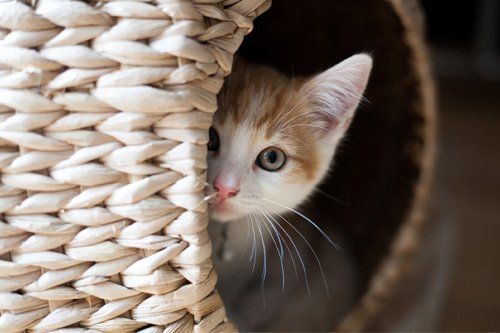Blog Post

What Cat Owners Should Know About Feline Hyperthyroidism
- By
- •
- 05 Aug, 2018

Is your older cat restless, ravenous, and losing weight no matter how much you feed him or her? These three symptoms may be present in a number of cat diseases. However, feline hyperthyroidism (FHT) is one of the most common causes of weight loss, excess hunger, and increased activity in older cats.
In the U.S., around 10 percent of cats over 10 years of age are diagnosed with FHT. If you suspect your cat suffers from this common endocrine disorder, here's what you should know.
Research Hasn't Yet Shown Why FHT Happens
The first cases of FHT were documented in 1979. Researchers know a lot more about the disease today but remain unsure about the exact causes of the condition. Some scientists believe that environment, modern cat lifestyles, and nutritional imbalances contribute to the high numbers of cats with FHT.
Scientists continue to research materials and food ingredients to find links with FHT. Some of the suspected (but not confirmed) causes of increased FHT are:
- Phenols
- Bisphenol A (BPA)
- Phthalates
- Soy isoflavones
- Fire retardants
Some of these ingredients are found in cat litter, cat food, or human fabrics. Again, however, scientists have no definitive proof that any of these substances causes FHT.
Veterinarians Must Diagnose FHT
While some cats with FHT show the classic signs of scruffy coats, increased vocalizations, huge appetites, skinniness, and extra thirst, not all cats with FHT exhibit these symptoms. Some cats become lethargic and refuse to eat. A cat with FHT and no appetite may be at a later stage of the disease.
These problems can be accompanied by additional FHT symptoms that include:
- Vomiting
- Diarrhea
- Respiratory issues
- Increased heart rate
However, all FHT symptoms - including enlarged thyroid lobes - can be signs of other feline diseases. Your cat's veterinarian is the only person who can definitively diagnosis FHT.
Diseases that present with FHT-type symptoms include:
- Poor digestion
- Cancer
- Kidney disease
- Diabetes mellitus
- Parasites
To make a diagnosis of FHT, the vet will first palpate (feel) for enlarged thyroid lobes on either side of your cat's neck. The two thyroid lobes often have growths on them called adenomas when a cat suffers from FHT.
Blood tests are necessary to confirm the diagnosis of FHT. Blood tests will show increased thyroxine levels (from thyroid glands) when FHT is the culprit causing your cat's illness.
Treatment Options Offer Hope for Cats With FHT
Common treatments for FHT offer hope for your cat. The best treatment for your particular feline should be determined by you and your veterinarian. Cost and availability of treatment facilities can be factors in making the best choice for your pet.
A medicine called methimazole is one treatment for FHT. The anti-thyroid drug is widely available and inexpensive for short-term use. Methimazole does help ease symptoms of FHT but is not a cure. The medicine must be administered daily for the rest of the cat's life if no other treatment is sought.
Surgery can be performed to remove the adenomas or other abnormal growths on thyroid lobes. This is the most invasive approach, and the cat must be anesthetized. The expense is about the same as a few years of methimazole doses. After surgery, no further FHT medication should be required.
Your cat will need a specialized facility to receive radioactive iodine therapy. This treatment is the most expensive option to address FHT but treats all of the abnormal tissue without the need for surgery and anesthesia.
Your cat will be radioactive after iodine treatment and will be quarantined for a short period. This could affect other health issues that must be treated.
Another option is chemical ablation, which is still considered an experimental treatment. Anesthesia and surgery are required with ablation treatment for FHT.
If your older cat seems anxious, mouthy, and skinnier than normal, contact Hirsch Animal Hospital to schedule an exam as soon as possible. Our in-house laboratory is available to accurately diagnose your pet in the Ponte Vedra and Greater St. John's County, Florida region.
LOCATION
Hirsch Animal Hospital
220 Valley Circle | Suite 101
Ponte Vedra Beach, FL 32082
Phone:
904-285-0023
Email:
hirschvet@gmail.com
BUSINESS HOURS
Business Hours:
Monday-Friday, 8 a.m.-6 p.m.
Saturday, 8 a.m.-1 p.m.
PAYMENT



LOCATION
Hirsch Animal Hospital
220 Valley Circle | Suite 101
Ponte Vedra Beach, FL 32082
Phone:
904-285-0023
Email:
hirschvet@gmail.com
BUSINESS HOURS
Business Hours:
Monday-Friday, 8 a.m.-6 p.m.
Saturday, 8 a.m.-1 p.m.
PAYMENT



SOCIAL
Share
Tweet
Share
Mail
Content, including images, displayed on this website is protected by copyright laws. Downloading, republication, retransmission or reproduction of content on this website is strictly prohibited. Terms of Use
| Privacy Policy
Content, including images, displayed on this website is protected by copyright laws. Downloading, republication, retransmission or reproduction of content on this website is strictly prohibited. Terms of Use
| Privacy Policy
Content, including images, displayed on this website is protected by copyright laws. Downloading, republication, retransmission or reproduction of content on this website is strictly prohibited. Terms of Use
| Privacy Policy
